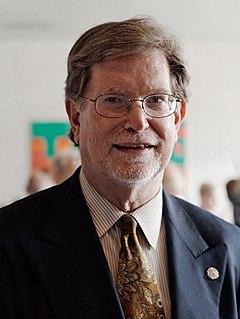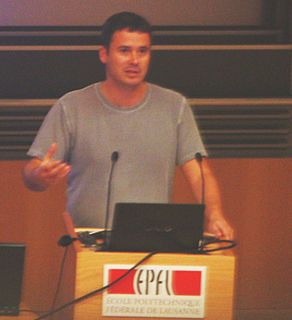A Quote by George Smoot
I always think of space-time as being the real substance of space, and the galaxies and the stars just like the foam on the ocean.
Related Quotes
Just think, Vishnu sleeps in the cosmic ocean, and the lotus of the universe grows from his navel. On the lotus sits Brahma, the creator. Brahma opens his eyes, and a world comes into being, governed by an Indra. Brahma closes his eyes, and a world goes out of being. The life of a Brahma is 432,000 years. When he dies, the lotus goes back, and another lotus is formed, and another Brahma. Then think of the galaxies beyond galaxies in infinite space, each a lotus, with a Brahma sitting on it, opening his eyes, closing his eyes.
... the only other place comparable to these marvelous nether regions, must surely be naked space itself, out far beyond atmosphere, between the stars, where sunlight has no grip upon the dust and rubbish of planetary air, where the blackness of space, the shining planets, comets, suns, and stars must really be closely akin to the world of life as it appears to the eyes of an awed human being, in the open ocean, one half mile down.
I think going into space would be like going deep into the ocean, like 5,000 meters down. When you go down that far, it's just awfully black. There's not much there except mud and some particles. I imagine space would be a similar thing. The only difference is you're hoping to bump into some sort of intelligent extraterritorial being.
We're in a time when bashing is the norm - especially on social media, where everybody's online and no one interacts face-to-face. There's a quote I found yesterday - it was hilarious: "People need to chill, like literally, we're floating in space on a giant rock we can't leave. Look at the stars or something instead of being awful." You think of floating on a rock in space as so alien, but that's exactly what we're doing.
In the 1920s the young English physicist Paul Dirac began trying to understand and describe the space-time evolution of the electron, the first elementary particle discovered by J.J. Thomson in 1897. Dirac was puzzled by an unprecedented property of space-time, discovered by Lorentz in his studies of electromagnetic forces, whereby if space was real, time had to be imaginary, and vice versa. In other words, space and time had to be a ‘complex’ mixture of two quantities, one real and the other imaginary.
I'm always looking to find order within the chaos. And sometimes when my life gets fairly chaotic, I'll take a walk outside. I think about the order and the perfection of galaxies of planets in orbit and traveling around space and thinking how chaotic the wars and divorces and riots on our planet must look from outer space.
There is nothing mysterious about space-time. Every speck of matter, every idea, is a space-time event. We cannot experience anything or conceive of anything that exists outside of space-time. Just as experience precedes all awareness and creative expression, the visual language of our photographs should ever more strongly express the fourth dimensional structure of the real world.




































